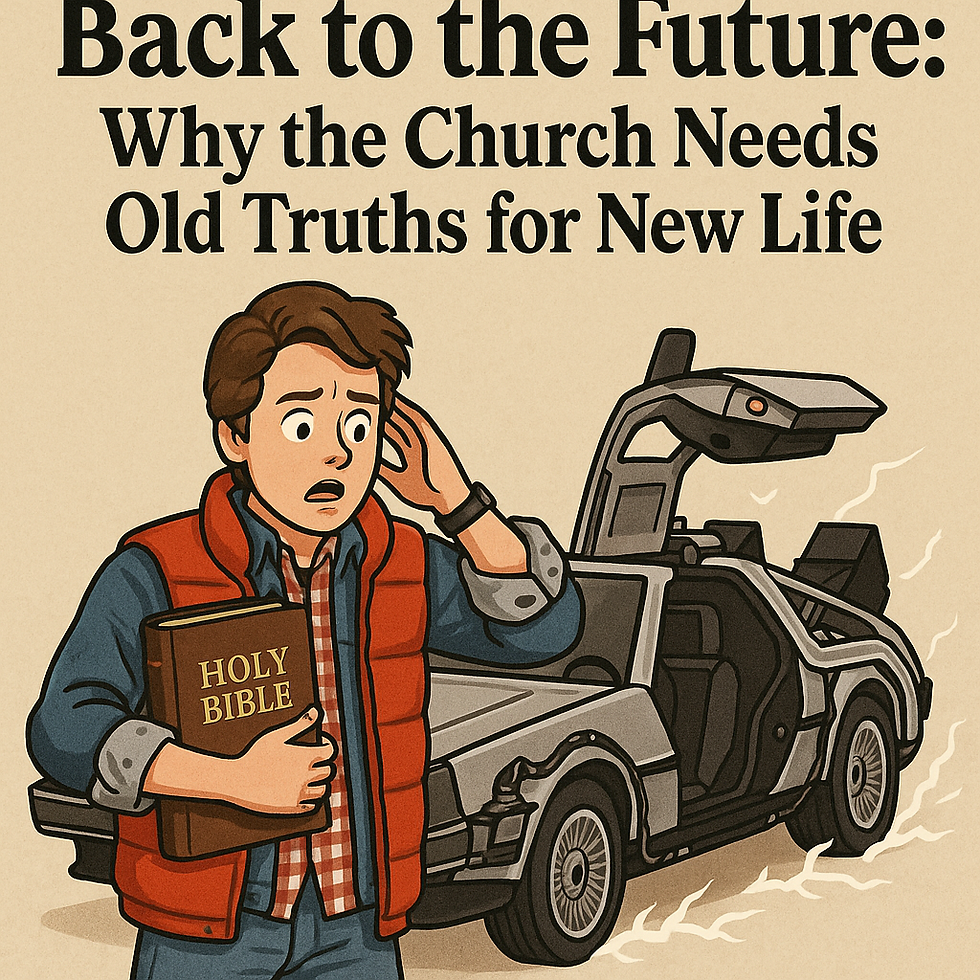The Pharisee and the Free Spirit Walk Into a Church…
- Jun 3, 2025
- 4 min read

In every generation, the Church must guard the purity and simplicity of the gospel of Jesus Christ. Two persistent errors threaten to distort that gospel from opposite directions: legalism and antinomianism. Though they appear to be at odds, both ultimately twist grace, hinder holiness, and obscure Christ.
A helpful image is that of a narrow road—the way of the gospel—flanked by two deep ditches. On one side lies the ditch of legalism, where faith becomes performance and rules replace relationship. On the other side lies the ditch of antinomianism, where grace becomes license and obedience is treated as optional. With good intentions, many veer to avoid one ditch—only to overcorrect and fall into the other.
And that is where many evangelical churches find themselves today. In rejecting the harsh legalism, spiritual abuse, and moral rigidity that plagued parts of fundamentalism, some have overcorrected. In the name of healing, they’ve downplayed the call to holiness. In the name of grace, they’ve softened God’s moral demands. But avoiding one ditch by driving straight into another is not the gospel path.
The gospel isn’t found in reaction—it’s found in revelation. The road to life is not a compromise between extremes; it is a Spirit-empowered walk with Jesus. It is the narrow way of transformation, where grace fuels obedience, love anchors holiness, and Christ remains the center.
Defining the Two Ditches
Legalism tries to earn or keep God’s favor through rule-keeping—whether the rules come from Scripture or from human traditions. It turns the Christian life into a transaction: “If I do good, God will love me.” But this reverses the gospel. God’s love is not the result of our obedience—it is the cause of it.
Antinomianism, on the other hand, claims that because we are saved by grace, God’s moral law no longer applies to the believer. It confuses forgiveness with freedom from all accountability. “Because I’m forgiven,” it says, “it doesn’t really matter how I live.”
These errors look different, but they share a common flaw: both pull the Christian out of step with Christ.
The Ditch of Legalism
Jesus confronted the Pharisees for exactly this kind of distortion:
“Woe to you, scribes and Pharisees, hypocrites! For you tithe mint and dill and cumin, and have neglected the weightier matters of the law: justice and mercy and faithfulness.” (Matthew 23:23)
Legalism exalts outward conformity but neglects inward transformation. It produces pride in those who think they’re succeeding, and despair in those who know they aren’t. Either way, it shifts trust from Christ to self.
Paul knew this ditch well. Reflecting on his past, he wrote:
“Whatever gain I had, I counted as loss for the sake of Christ.” (Philippians 3:7)
To lean on law-keeping is to reject Christ’s sufficiency. To rely on rules is to reject grace.
The Ditch of Antinomianism
But today, in many evangelical circles, the greater danger may be the opposite ditch: antinomianism. In trying to correct the cold, rigid faith of past generations, many have adopted a theology allergic to commands and afraid to mention sin. Holiness is labeled legalism. Conviction is confused with condemnation. “Authenticity” becomes an excuse to avoid repentance.
Paul confronts this in Romans:
“Shall we continue in sin that grace may abound? By no means!” (Romans 6:1–2)
Grace doesn’t eliminate the call to obedience—it empowers it.
James reminds us:
“Faith by itself, if it does not have works, is dead.” (James 2:17)
And Jesus said:
“If you love me, you will keep my commandments.” (John 14:15)
Antinomianism may sound freeing, but it leaves believers aimless, immature, and detached from the transforming power of grace.
The Remedy: Walking the Gospel Road
The Christian life is not a balancing act—it’s a journey on a narrow road, walked daily with Christ. The solution to legalism isn’t lawlessness, and the answer to antinomianism isn’t more rules. The answer is Christ Himself.
In God’s Word, we see the whole picture: the law that reveals God’s character, the grace that redeems us, and the call to walk in love and truth.
In prayer, we meet with God—not as frightened servants or defiant rebels, but as beloved children. Prayer humbles the legalist and awakens the antinomian. It restores our hearts to the One we belong to.
“Your word is a lamp to my feet and a light to my path.” (Psalm 119:105)
“Lead me in the path of your commandments, for I delight in it.” (Psalm 119:35)
We obey because we love the One who saved us. We delight in the law because it reflects the character of our Lord.
John Owen once warned:
“Be killing sin, or sin will be killing you.”
But he also wisely observed:
“A man may easier see without eyes, speak without a tongue, than truly mortify one sin without the Spirit.”
And it is through the Word and prayer that the Spirit does His deepest work.
Legalism and antinomianism are not outdated theological relics—they are the ditches that still run on either side of the road today. One tells you to earn what’s already been given. The other tells you to ignore what grace was meant to produce. But the gospel says:
“Come to Me. Abide in Me. Walk with Me.”
We are saved by grace alone, through faith alone, in Christ alone. And that same grace teaches us to say no to sin and yes to godliness (Titus 2:11–12).
So stay on the road. Don’t fall into the ditch of law or the ditch of license. Walk with Jesus—daily, prayerfully, joyfully. His Word and Spirit will guide your steps.
Open your Bible. Bow your knees. Walk with your Lord.
That is where true freedom and holiness meet.
That is the road where Christ is found.




Comments